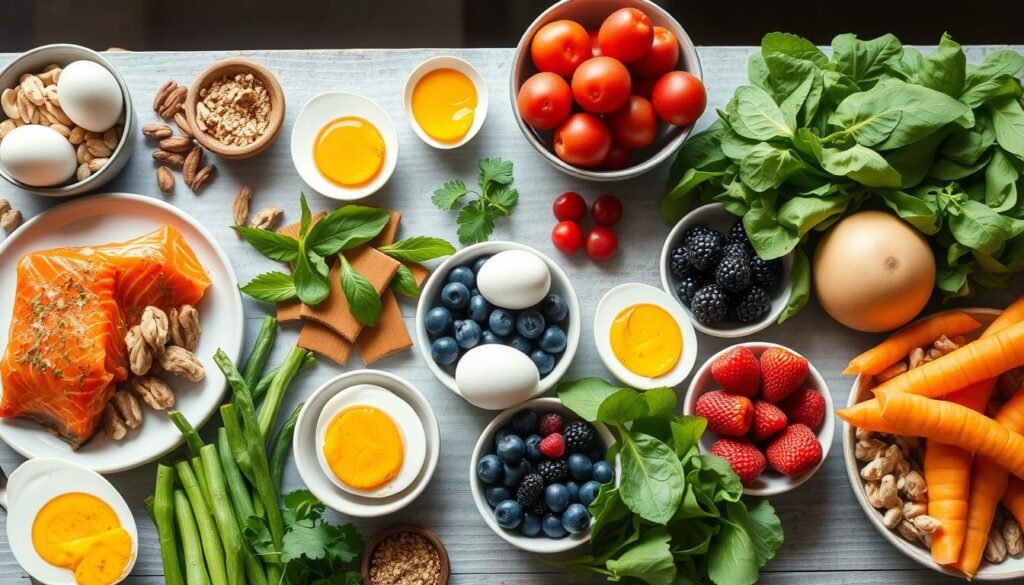The journey to recovery from food addiction or dietary imbalances often begins with understanding how nutrition impacts our brain chemistry and physical wellbeing. Recovery foods aren’t just about what you eat—they’re about how specific nutrients can repair damaged neural pathways, reduce cravings, and restore metabolic balance. In this comprehensive review, we explore four groundbreaking books that offer different approaches to using food as medicine in the recovery process.
How Recovery Foods Support Addiction Healing
Recovery foods play a crucial role in healing both the body and brain during addiction recovery. Research shows that certain nutrients can help repair damaged neural pathways, reduce inflammation, and restore proper neurotransmitter function. The right combination of proteins, healthy fats, and complex carbohydrates provides the building blocks your body needs to heal.
Each of the books we’re reviewing approaches recovery foods from a different angle—some focus on the biochemical aspects of addiction and amino acid therapy, while others emphasize mindfulness and emotional healing through nutrition. What they share is a recognition that what we eat profoundly affects our ability to overcome addictive patterns.
Key Nutritional Components in Recovery
Amino Acids
These protein building blocks help repair muscle damage and are essential for neurotransmitter production. Specific amino acids like tyrosine and tryptophan directly influence dopamine and serotonin levels, which are often imbalanced during addiction.
Healthy Fats
Omega-3 fatty acids and other healthy fats support brain health and reduce inflammation. They’re critical for cell membrane integrity and help the body absorb fat-soluble vitamins necessary for healing.
EAT!: A Guide to Radiant Recovery Using Food and Amino Acids

The Science of Amino Acid Therapy
This comprehensive guide takes a biochemical approach to recovery, focusing on how specific amino acids can repair the addicted brain. The author explains how neurotransmitter imbalances contribute to cravings and how targeted nutrition can restore proper brain function.
Key Takeaways:
- Detailed protocols for using amino acid supplements to target specific addiction types
- Explanation of how neurotransmitter deficiencies drive cravings and addictive behaviors
- Step-by-step meal plans that support neurotransmitter balance
- Scientific research supporting the amino acid approach to addiction recovery
Who This Book Is For:
Ideal for those who want a science-based approach to recovery and are interested in understanding the biochemical roots of their addiction. This book is particularly valuable for people who have tried willpower-based approaches without success.
Ready to Repair Your Brain with Targeted Nutrition?
Discover how specific amino acids and recovery foods can help reduce cravings and repair neural pathways damaged by addiction.
Food Addiction Recovery: Breaking Free from Food Junkies
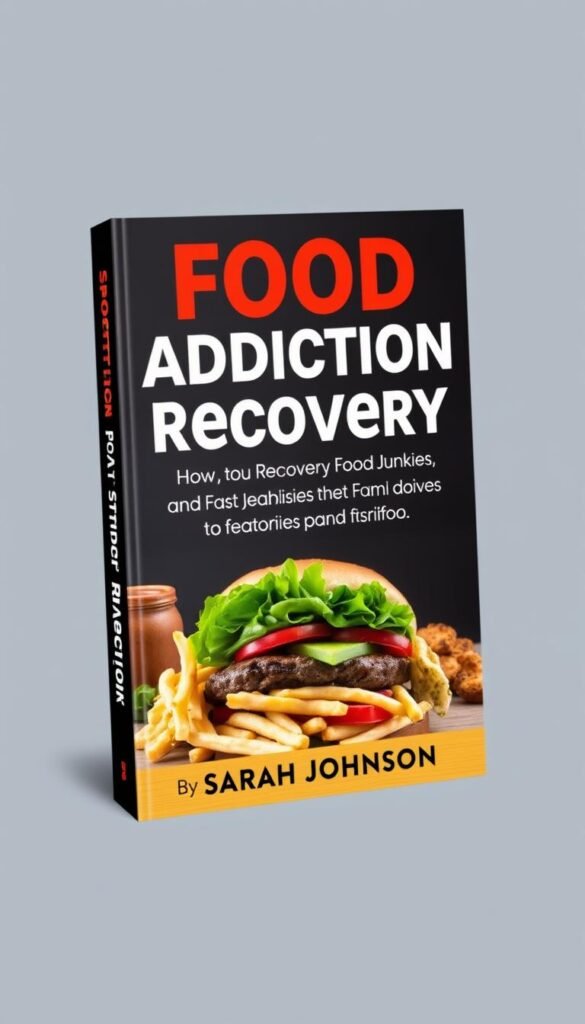
Practical Strategies for Fast Food Addiction
This practical guide focuses specifically on overcoming addiction to processed foods and fast food. It provides actionable strategies for breaking the cycle of food addiction through a combination of nutritional approaches and behavioral techniques.
Key Takeaways:
- Identification of trigger foods and how to replace them with healing alternatives
- Practical meal planning for transitioning away from processed foods
- Understanding the psychology behind fast food addiction
- Recovery foods that specifically target fast food withdrawal symptoms
Who This Book Is For:
Perfect for those struggling specifically with fast food or processed food addiction. The book offers practical, step-by-step guidance for those who need concrete strategies rather than just theoretical knowledge.
Break Free from Fast Food Addiction
Learn practical strategies to overcome processed food cravings and discover healing recovery foods that satisfy without triggering addiction.
365 Days of Love for Addiction Recovery: A Mindful Approach
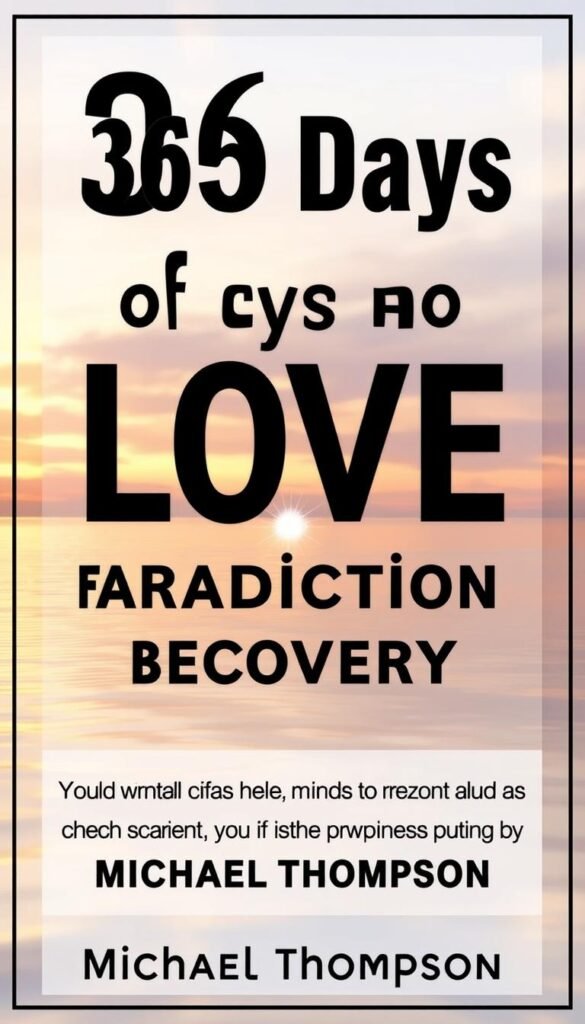
Emotional Healing Through Daily Practice
This unique guide takes a holistic approach to recovery, combining nutritional wisdom with daily mindfulness practices. It addresses the emotional aspects of addiction recovery while providing guidance on using food as a healing tool throughout the recovery journey.
Key Takeaways:
- Daily mindfulness exercises paired with nutritional recommendations
- Emotional healing techniques that complement dietary changes
- Inspirational quotes and affirmations to support the recovery journey
- Year-long structure that guides readers through different phases of healing
Who This Book Is For:
Ideal for those who recognize the emotional component of their addiction and want a holistic approach that addresses both nutritional and psychological aspects of recovery. The daily format makes it perfect for those who benefit from consistent, structured guidance.
Nurture Your Recovery Journey Day by Day
Combine mindfulness practices with recovery foods knowledge for a holistic approach to healing addiction patterns.
Diet Recovery 2: Restoring Metabolic Health
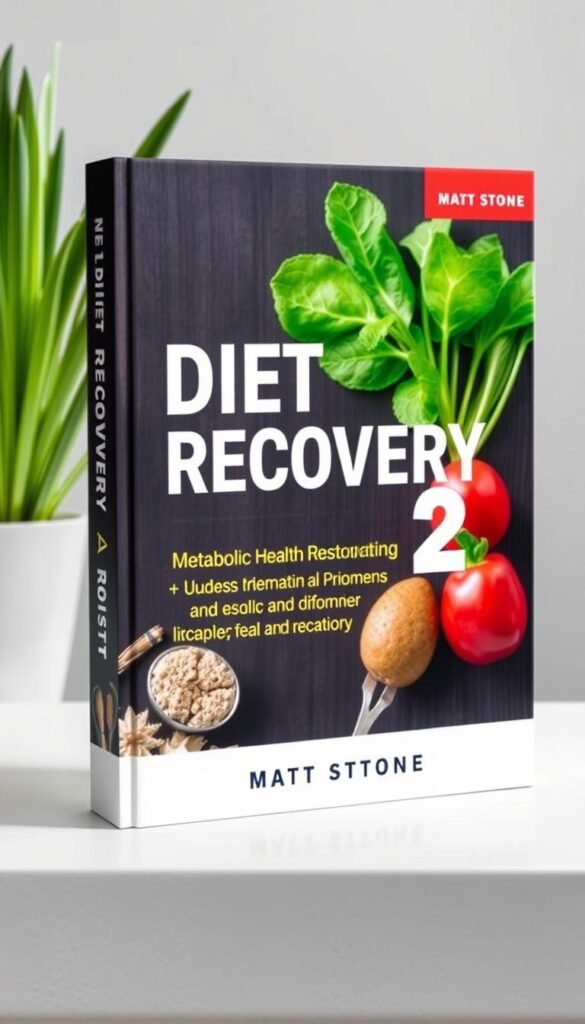
Metabolic Restoration Through Nutrition
This controversial but influential book takes a different approach to recovery foods, focusing on metabolic healing rather than specific addiction pathways. It challenges conventional dietary wisdom and presents a unique perspective on how to restore metabolic function damaged by restrictive dieting.
Key Takeaways:
- Understanding how restrictive dieting damages metabolic health
- Protocol for restoring metabolic function through strategic nutrition
- How to recognize and address symptoms of metabolic damage
- Recovery foods that support thyroid function and hormonal balance
Who This Book Is For:
Best suited for those who have a history of restrictive dieting and are experiencing symptoms of metabolic damage such as constant hunger, energy issues, and weight regulation problems. This approach is particularly valuable for those who have tried multiple diets without lasting success.
Repair Your Metabolism and End Diet Frustration
Discover how the right recovery foods can restore metabolic health and end the cycle of restrictive dieting.
Comparing Different Recovery Food Approaches
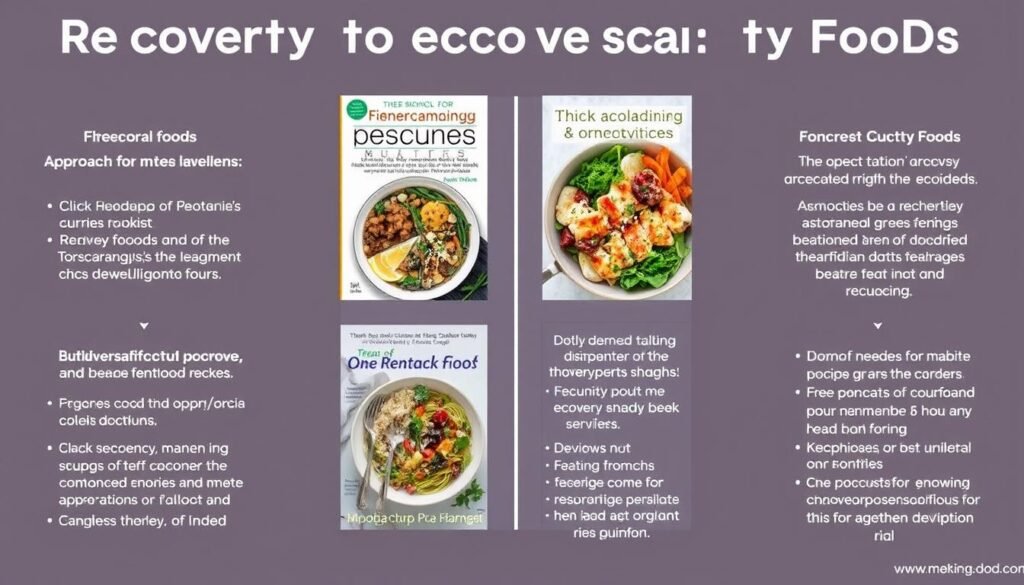
| Book | Primary Approach | Key Recovery Foods | Best For |
| EAT! | Biochemical/Amino Acid Therapy | Protein-rich foods, amino acid supplements, nutrient-dense vegetables | Science-minded individuals seeking targeted biochemical repair |
| Food Addiction Recovery | Practical Substitution Strategy | Whole food alternatives to processed foods, craving-reducing snacks | Those struggling specifically with fast food and processed food addiction |
| 365 Days of Love | Mindful Eating & Emotional Healing | Mood-supporting foods, mindfully prepared meals | People seeking emotional support alongside nutritional guidance |
| Diet Recovery 2 | Metabolic Restoration | Metabolism-supporting foods, thyroid-supporting nutrients | Those with a history of restrictive dieting and metabolic damage |
The Science Behind Recovery Foods
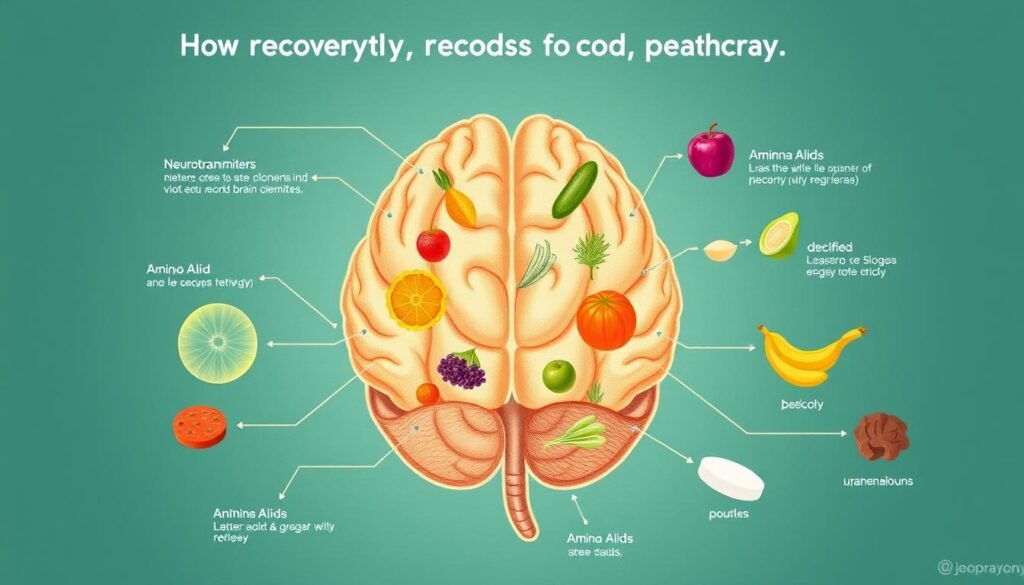
Research shows that specific nutrients play crucial roles in addiction recovery by supporting the body’s natural healing processes. Amino acids serve as precursors to neurotransmitters like dopamine and serotonin, which are often depleted during addiction. Healthy fats support cell membrane integrity and reduce inflammation in the brain and body.
Neurotransmitter Support
The amino acid tyrosine helps produce dopamine, which is often depleted in addiction. Tryptophan supports serotonin production, helping regulate mood and reduce cravings. These building blocks are essential for the brain to repair damage caused by addictive substances or behaviors.
Inflammation Reduction
Many recovery foods contain antioxidants that combat oxidative stress and reduce inflammation. This is particularly important as addiction often creates inflammatory responses in the body and brain, which can perpetuate cravings and impair healing.
Practical Application: Creating Your Recovery Foods Plan

Implementing the knowledge from these books requires a personalized approach based on your specific recovery needs. Here’s a framework for creating your own recovery foods plan:
Assess Your Needs
Identify your specific addiction patterns and symptoms. Are you dealing with sugar cravings, processed food addiction, or metabolic issues from restrictive dieting? This will help you choose the right approach.
Start With Basics
Begin with foundational recovery foods that support overall health: quality proteins, healthy fats, and nutrient-dense vegetables. These provide the building blocks your body needs regardless of your specific approach.
Implement Gradually
Rather than making dramatic changes all at once, gradually incorporate recovery foods into your diet. This allows your body to adjust and helps you identify which foods have the most positive impact.
Finding Your Path to Recovery Through Nutrition
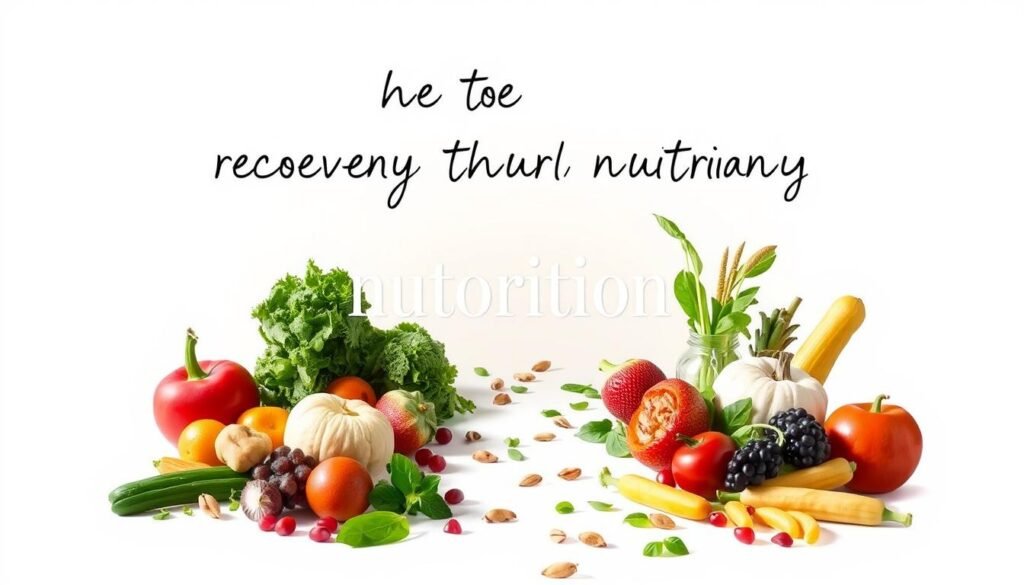
The journey to recovery through nutrition is highly personal. Each of the books we’ve reviewed offers valuable insights and approaches, but the most effective strategy will depend on your unique circumstances, preferences, and needs.
For those seeking a science-based approach with specific protocols, “EAT!” provides detailed guidance on amino acid therapy. If you’re struggling specifically with fast food addiction, “Food Addiction Recovery” offers practical strategies for breaking those patterns. “365 Days of Love” combines nutritional wisdom with emotional support for a holistic approach, while “Diet Recovery 2” addresses the metabolic damage that can result from restrictive dieting.
Begin Your Recovery Journey Today
Choose the approach that resonates most with your needs and start implementing recovery foods that support your healing process.

